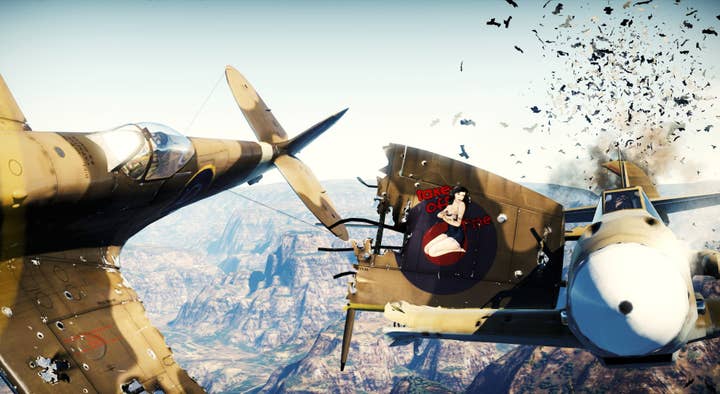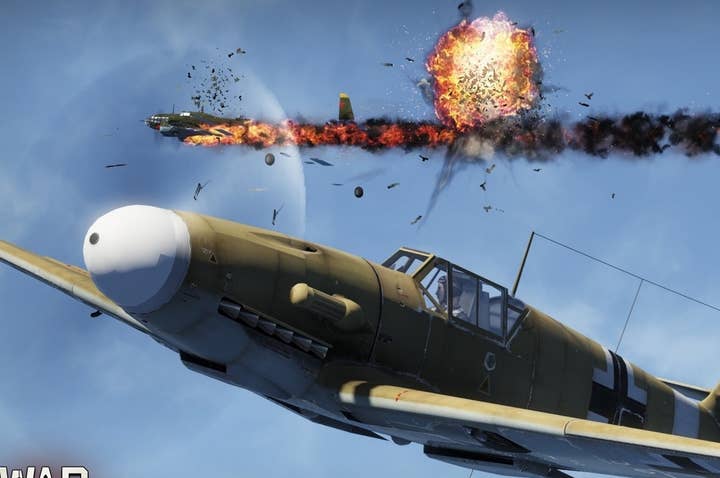Gaijin Entertainment: "We're not the greedy bastards here"
Free games on consoles will have to hit higher standards, says CEO Anton Yudintsev
Whether by micro-transactions or rising retail prices, the cost of AAA gaming on consoles is creeping ever upwards. It was in the air as eager gamers lined up to push PlayStation 4 to record-breaking sales. It was on the forums and and in the comments threads as disappointed Xbox One fans balked at the prices attached to Forza 5's rarest vehicles. And while you'd be hard pushed to find a member of the game-buying public that sees it as a good thing, the trend shows no clear indication of reversing - or even slowing down.
Thankfully, on this generation of consoles the consumer will have options, and more of them than ever before. Now that the furious back-and-forth over resolution and quality of RAM has started to subside, it's important to consider that these consoles were designed to accommodate one of the most potent disruptive forces in the recent history of the games business: free, the wallet-friendly price-point that has flourished in the open environments of PC and mobile gaming.
But is the console audience ready? Anton Yudintsev, CEO of the Russian developer Gaijin Entertainment, believes that free-to-play developers will have to raise their standards to pass muster on PlayStation 4 and Xbox One. After all, console gamers are the segment of the market that harbours the most suspicion of free-to-play gaming in general, and while World of Tanks and Dust 514 have already introduced the concept on PlayStation 3 and Xbox 360, much more will be necessary to earn their faith.
"Console gamers are more used to the concept of buying games, premium games," Yudintsev says. "But one of the reasons for that is that there haven't been enough [free-to-play] games at a console level of quality. Well, we are a console developer. War Thunder is console quality."
Along with SOE's Planetside 2 and Zombie Studios' Blacklight: Retribution, Gaijin's War Thunder will help to make the case for free-to-play in the early life of the PlayStation 4. According to Yudintsev, the team drew on its experience making console titles like Il-2 Sturmovik, and applied the lessons in player engagement and retention evident in the very best free-to-play games. It would be foolhardy, he says, for developers to assume that the console audience will accept technical and gameplay compromises in exchange for dozens of hours of free entertainment. They won't. If free-to-play is to become a fixture for the core console audience, it will be through a combination of best practices from both schools of thought.
"In terms of core gameplay, the production quality, technical excellence, most free-to-play games do not concentrate on that at all"
"In free-to-play, there is a lot of expertise in how to make a game design interesting for people to play for months, or even years - the meta-game design," he says. "But in terms of core gameplay, the production quality, technical excellence, most of them do not concentrate on that at all. There are exceptions, but most of them don't. "And that gives both sides an opportunity. They can take lessons from each other. It's a huge opportunity, and a lot of [console] developers don't see that. They either don't believe in the free-to-play model at all, or they think they know better. They know some things better, of course, but not everything."
Indeed, the demanding nature of the core gaming audience has pushed free-to-play behemoths like League of Legends and Dota 2 to ever higher standards of excellence, and that will be intensified on console. For Yudintsev, gamers are unlikely to separate 'free' and 'paid' in their minds when it comes to choosing how to spend their time. The casual gamer is far less discerning, but if you're making a free-to-play aerial combat sim - like War Thunder - it needs to stand up to comparisons with a series like Namco Bandai's Ace Combat. If you're making a free-to-play shooter, it needs to stand up to comparisons with Call of Duty and Battlefield. And the lingering mistrust of the free-to-play model and its accoutrements (i.e. micro-transactions) will only make that task more challenging.
War Thunder is only scheduled for release on PlayStation 4, but Yudintsev is convinced that both Sony and Microsoft are eager to see the free-to-play model proliferate, just as they are eager to secure the services of indie developers creating wildly diverse, reasonably priced games. Entertainment platforms need content, now more than ever before, and the simple fact is that there will be fewer choices coming from the blockbuster studios.
However, Yudintsev dismisses the notion that the PlayStation Network could become over-crowded and confusing to the degree seen on mobile platforms "Both Sony and Microsoft see [the iOS and Android app stores]. They see new ideas and new money, people spending more time and more money playing mobile. They want to change that," he says.

"On the iOS and Android markets, some of the games are brilliant - very simple, very casual, but amazingly good - but basically most of the games there are not good... The worst games on mobile phones are so bad that they would never pass the minimum requirements from Sony and Microsoft, and I think that's necessary."
Yudintsev clearly sees Gaijin as different from most developers building free-to-play games. The studio earned its reputation with games made for consoles and released through the traditional publisher system, and that has created a confidence within the company that it can meet the challenges posed by a new business model without sacrificing its foundational values. Indeed, the need to be directly responsible for the PR and marketing around War Thunder - implementing more efficient lines of communication with the audience - is something that every independent developer must now do in order to thrive in the self-publishing environment. Making games is far from easy, Yudintsev says, but it's all for nothing if you can't build and support your customer-base.
"We wanted to attract more people, and we've been successful. That's more than any flight simulation game in the last decade"
"We're a relatively small studio - we have around 100 people - and for us the biggest challenge isn't to maintain the game after launch. We actually like that," he says. "We can enhance it, and improve it. That's good for us. I'm not sure it's good for big, major studios, but we can be very flexible.
"The bigger challenge was marketing and stuff like that. When we started the open beta, we actually didn't have any marketing team at all. We had one person, and he was responsible for marketing, for PR, for everything. So although there were a lot of technical challenges - server size, maintaining those servers, stuff like that - that's part of the job that we like. We're a development studio. We have about 100 people and almost every single one is on development. Even now, our core marketing team is four people."
As of the start of November, almost exactly a year after it started, War Thunder's open beta on PC had attracted 5 million players. For Yudintsev, it was a confirmation that Gaijin's diligent efforts to breathe life into the dwindling flight genre by making it free were not in vain. "Ten years ago, flight simulation generally was rather popular," he says. "Three years ago, it was so niche we could almost know everyone by name, and mostly it was the same players as ten years ago.
"We wanted to attract more people, and we've been successful. That's more than any flight simulation game in the last decade."
But will the same be true on PlayStation 4? The response to Forza 5's micro-transactions have fanned the flames of the whole free-to-play debate among console gamers, and the value proposition presented by 'free' games is once again under close scrutiny. Yudintsev shakes his head. In a world where Call of Duty takes $1 billion in less than a week, it's the studio trying to give a good game away for nothing that is called upon to explain its methods.
He pauses, and smiles. "We're not the greedy bastards here."
The interview with Anton Yudintsev was conducted in September.

